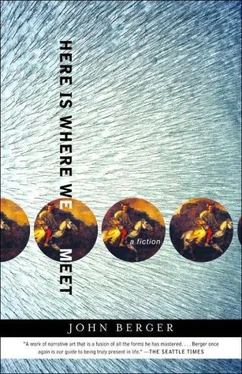I was thirteen when she had to have all her teeth pulled. She had been brought back home in a taxi. I stood at the door of the bedroom. She lay on her back, chin protruding, cheeks hollow through the new lack of teeth. I knew I had to choose between two things, the only two things I could do at that instant. I could scream or I could go and lie beside her. So I lay beside her. She was too artful to show her pleasure immediately. We both had to wait. After several minutes she pulled an arm out from under the bedclothes and held my wrist in her cold hand. She kept her eyes shut. Most people, she said, can’t stand the truth. It’s too bad but there it is, most people can’t stand it. You, John, I think you can bear the truth, we’ll see. Time will tell. I didn’t reply. I stayed there on the bed.
Most of the time I’m lost, I tell her in the café with the embassy employees.
That’s why you see clearly.
Very little.
Better than me!
She laughs again. A cascading laugh like the sound of a stream that has broken its banks. I hear it as an invitation to dance, to dance on the ruins, so I push back my chair, and with my arms held up like a ballroom dancing partner, I take a step towards where I think she is. The embassy employees look up, mouths open. I sit down. When the general talk resumes, I whisper:
So where do I see you next?
On the aqueduct. The Águas Livres aqueduct.
It’s very long, fourteen kilometres, I think.
Where it crosses the Alcântara valley. The arches are sixty metres high at that point. From up there you can almost see America! I’ll be waiting for you by the sixteenth arch.
The sixteenth counting which way?
What do you think? From the Mãe d’Agua. I’ll meet you there on Tuesday morning.
Not before?
We all have one day in the week that wishes us well.
Which was mine?
It was Tuesday. You will probably die on a Tuesday.
And yours?
Friday. You didn’t notice? I must say, I thought you would have noticed.
You weren’t there that often.
Far more often than you believed. I wasn’t there all the time, which is what you wanted. I wasn’t there for ever.
Maybe you did seem happier on Fridays, I say.
Not so much a question of being happy, more a question of knowing I was a bit more protected and therefore freer.
When did you discover Friday was your day?
When I was ten; I noticed that if I sang on a Friday I had perfect pitch. Invariably.
Is Friday still your day?
No. Now my day is Tuesday because I’m here for you.
She laughs yet again. An anticipatory laugh. As if she sees the two of us approaching a big joke.
Lisboa is a city of endurance, unanswerable questions and pet names. The Águas Livres aqueduct was completed in 1748. It survived, perfectly intact, the earthquake that destroyed the centre of the city seven years later. When the army engineers planned the aqueduct’s course, did they try to avoid the geological fault-lines? Otherwise its exemption remains a mystery. Later, many subsidiary aqueducts were completed and added in order to augment the water supply flowing along the Águas Livres. In reality, the water — as sceptics had warned from the beginning — was never enough for the city.
In the nineteenth century the aqueduct was known as the Passeio dos Arcos, the Road of Arches, because people from the villages in the west walking to the city to sell their produce or their labour, used it as a short cut. They no longer needed to go down into the Alcântara valley, cross the water and climb up; they could just walk one kilometre across the sky. It is said that this is why they gave pet names to the thirty-odd arches of the Alcântara, names like Lia, Adila, Carolina, Sandra, Iracena. And to the great pointed arch in the middle, which is still the highest stone arch in the world, they gave the name of Maira.
The first modern proposal to bring water to the city by an aqueduct — the Romans had tried it before — was prompted, not so much by a concern about hygiene or the population’s chronic lack of drinking water, as by the authorities’ fear of fire. Every year, in district after district of the city, fires were destroying property.
When the aqueduct was finished the Marquês and bankers arranged to have their own private aqueducts siphoning off the great one. Meanwhile the poor, with no water where they lived, remained at the mercy of the public fountains which, when there was a drought, went dry. Or else they had to buy water from the water-seller at a price they could not afford. This was what the Águas Livres, the so-called Free Water, turned out to be.
Do you always want everything? Her voice interrupts me as I think.
I remember her peeling and slicing cooked beetroots, hands holding the beet, the stubby knife, her stained fingers and the shiny purple crimson of the slices, the intensity of whose colour somehow matched the intensity of her insistence on the immediate and the day-to-day. As soon as I started enquiring about how I could get up on to the aqueduct, I understood why she had slyly made the rendezvous for the following Tuesday. It was going to take some time. All entrances were locked and one had to apply for official permission from the water company. Even supposing that one had a persuasive reason for asking for permission, there was bound to be some bureaucratic delay. I decided I would claim that I was writing a story about Lisboa.
Do you know the city well? the public relations lady asked me. She was looking worried, as if she had too many exam papers to correct, although clearly she wasn’t a teacher. It occurred to me that I should have offered her some Toicino do Céu. She would have eaten them absentmindedly while working on her computer.
No, I replied, I love the city but I don’t know it well. That’s why I need your help.
As you are probably aware, the Águas Livres supplied water to the city until a very few years ago. Now it doesn’t but we keep it running as — how do you say? — as a kind of homage? You could go up on Monday morning with Fernando. He’s the maintenance inspector for the water channels. 8:30 a.m., here in this office, Monday!
Could it be Tuesday?
Yes, but I thought you said it was urgent.
Tuesday would be better.
Then come Tuesday.
Fernando turned out to be a man in his mid-sixties, on the point of retirement. He had worked all his life for the Empresa Portuguesa das Águas Livres. He kept his eyes screwed up, he held himself very upright for his age, and he had the air of a man used to being alone and away from the crowds — like a shepherd or a steeplejack. He led me very quickly through the imposing temple-like building of the reservoir, which can hold 5,000 cubic metres of water. It was clear he did not like the temple — it had been built for too many people and too many speeches had been made there.
His private passion was for the water on its long, solitary, unnatural, improbable journey from its sources. A journey underground, over ground, and through the sky. Up there in its ducts the water had to be kept cool and well mixed, tranquil, and transparent, with the correct amount of light so that it did not become turgid. As soon as we were on the steps climbing up from the reservoir to the aqueduct, he slowed down.
The aqueduct at its top is only about five metres wide and consists of an apparently endless stone tunnel, on either side of which there is an open, very straight path, with a parapet to prevent people falling off. Fernando considered the water in the aqueduct as something alive, that had to be protected, fed, cleaned out, looked after — almost like an animal in a zoo. Perhaps an otter. Once a week he walked the fourteen kilometres to its sources in the Cavenque, checking everything. I think he had the impression that, like an otter, the water recognised him when he approached. He was dreading his retirement.
Читать дальше












